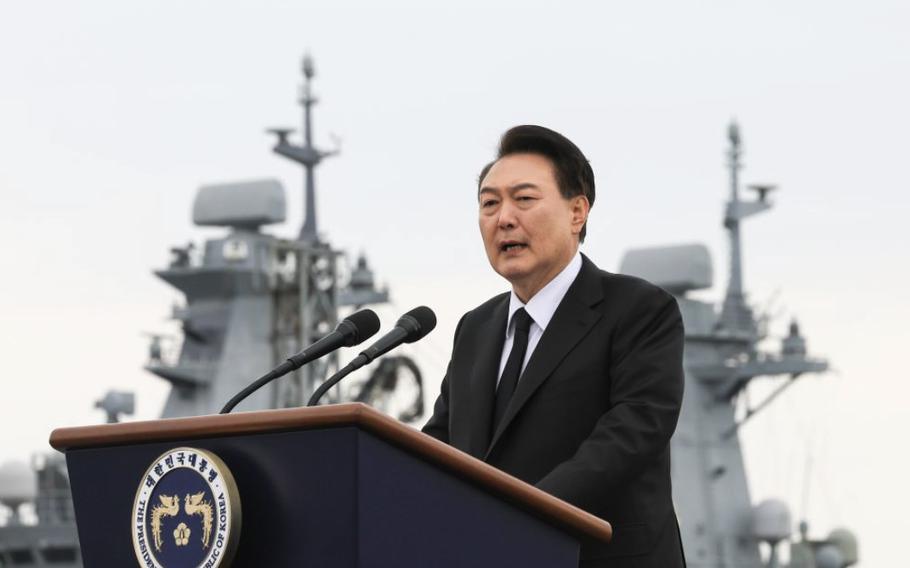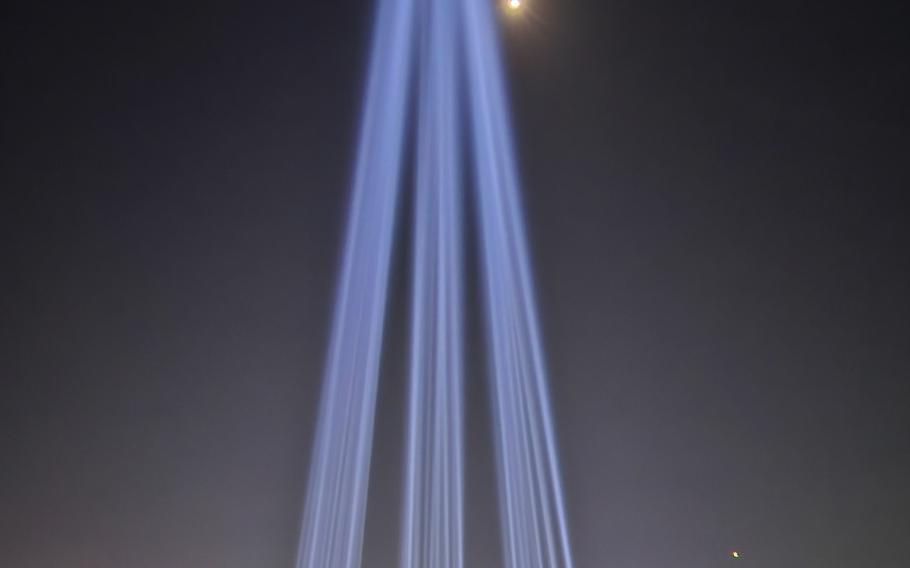
South Korean President Yoon Suk Yeol gives a speech during the West Sea Defense Day memorial service at the 2nd Fleet Command headquarters in Pyeongtaek, South Korea, March 22, 2024. (South Korea Presidential Office)
CAMP HUMPHREYS, South Korea — South Korea’s government honored the 55 sailors and marines killed since 2002 in combat against North Korean troops for the country’s ninth annual West Sea Defense Day held recently.
The government observes West Sea Defense Day on the fourth Friday of March to memorialize the 55 South Korean troops who were killed between 2002 and 2010 in the West Sea, also known as the Yellow Sea, near the Northern Limit Line, the unofficial maritime border dividing the Korean Peninsula.
The Ministry of Patriots and Veterans Affairs marked the occasion by commissioning a display of 55 lights shining skyward to honor the service members at the Daejeon National Cemetery in Daejeon city, roughly 80 miles south of Seoul.
Speaking at South Korea’s 2nd Fleet Command headquarters in Pyeongtaek city Friday, President Yoon Suk Yeoul said he expressed his “deepest sympathy” to the families and comrades of the sailors and marines who were killed in the Yellow Sea by North Korean forces.
“My government and I will remember and never forget the heroes of the West Sea,” Yoon said in a televised speech. “We once again commemorate the 55 proud heroes who defended the West Sea, who deeply engraved the spirit of freedom and patriotism in the hearts of the people.”
The first skirmish took place on June 29, 2002, when two North Korean patrol boats crossed the maritime border and opened fire on pursuing South Korean patrol boats. Six South Korean sailors and an estimated 30 North Koreans were killed in the fight, according to the South’s navy.

Fifty-five sailors and marines killed in combat are memorialized by lights beamed skyward at Daejeon National Cemetery, South Korea, March 21, 2024. (South Korea Ministry of Patriots)
The second incident occurred on March 26, 2010, when the Pohang-class corvette Cheonan was hit and sunk by a North Korean torpedo, killing 46 sailors, according to an international investigation. A South Korean navy diver later drowned while searching for missing sailors from the Cheonan.
Eight months after the Cheonan’s sinking, North Korean forces fired roughly 170 artillery rounds at the South’s Yeonpyeong Island, killing two South Korean marines and two civilians on Nov. 23, 2010.
Yoon described the incidents as a “cruel provocation” by the North and called for the South’s people to “unite their hearts to encourage and support our military.”
Ministry of Patriots and Veterans Affairs vice minister Lee Hee-wan, a retired navy captain, was aboard a South Korean patrol boat during the naval battle in June 2002. He was shot in both legs during the fight and his right leg was amputated.
“[West Sea Defense Day] is a day for the entire nation to cherish the noble sacrifices of the soldiers who defended the territorial waters of [South Korea], making it an exceptionally monumental day in the history of national defense,” Lee said in a written interview with Stars and Stripes on Friday.
Lee said he believed North Korea “will not abandon its provocations” but added there was a “clear answer” on how the South should respond.
“By standing united as a nation and showing a consistent front, we can demonstrate that we are neither intimidated nor shaken, thereby weakening the motivation behind North Korea’s provocations,” Lee said.
Lee said he often thinks about the South Korean sailors and marines killed in the last two decades and that it was his duty to support their surviving family members.
“When I think of the bereaved families of my comrades, my heart always aches,” he said. “The grief of losing a beloved son, husband, father may never fade no matter how much time passes but I want to say, ‘We, the surviving brothers and sisters in arms, will be here to support you.’”